I’ll assume you know what spaced repetition is. If not, check Resources/Further Reading since they explain it better than I can. I don’t write introductions well. I’ll give some advice, and links to all the other good blog posts I know of.
Note-Taking Broadly Considered; How I Research Things
Obviously, the practice of spaced repetition is to technoprosthetize your long-term memory. In the same way, I view the practice of taking notes as a way of extending your working memory into the digital.
I use the program Obsidian for writing notes.
I never took notes in school; as a whole I only started the practice in ~2020 once I began somewhat seriously studying nutrition, computer science, western philosophy, and a few other topics, and realized that the sheer scope of these various constellations had since expanded past the celestial sphere of my immediate stream of consciousness, warranting some kind of concretization that allowed me to pick up this or that train of thought again when the appropriate occasion returned, something indeed many a man allows to remain a spontaneous and entirely mental process.
I tried Notion, OneNote, and finally used Emacs Org Mode for a while (which I in retrospect consider to have pretty much been a complete waste of time), coinciding with an interest in free software and Linux (time well spent). But I never got serious, with my vault consisting of <20 pages compared to the 1639 in the biology directory alone. But once I used Obsidian, I didn’t look back. It’s hard to say if it lacks anything the aforementioned programs have; Obsidian has a lot of features, and you can safely eschew any of them if they don’t fit your way of learning things. Tags? Never used them, yet I’m sure some people can’t live without them. The graph view? Maybe once in a blue moon to see how far gone I am. Et cetera. In fact, I highly recommend the Hider and Style Settings plugins to remove all UI elements associated with features you don’t use or would otherwise distract you.

‘Zettelkasten’ is the obligatory buzzword when we’re talking about Obsidian and similar programs in the sphere. But technically, I have a wiki; I think the hard sciences like biology are probably better suited as such until you’re at a researcher-tier level of abstraction (but even then it’s usually just ultimately a matter of syntax). What I mean is that the individual notes that constitute a zettelkasten proper are, generally speaking, atomic and often take on a ‘declarative’ form. Andy Matuschak’s ‘working notes’ are a great example of this, with notes titled things like “Evergreen notes permit smooth incremental progress in writing” I originally tried making cards this way for a bit, but I found it to be pretty useless and way too fragmented, and so at this point there are precisely 0 cards with a ‘declarative’ form remain; all my notes refer to nouns, much like how the pages on Wikipedia are. Mere concepts even at the most abstract.
Safe to say the concept of [[linking]] probably represents the pièce de résistance of Obsidian’s features. But I’m using it less and less. (For whatever reason I think being minimalist as possible is the most fruitful…) But the reason is because the backlinks section exists. You don’t need to have the [[]] syntax. At best it’s just a 2-tier prioritization system of what meets my eye first, or pragmatic reasons like one-time aliasing something, e.g. not wanting to abridge synonyms for syntactical reasons, etc. You can alias a page and easily hardlink it as such, or expand its repertoire.
I have the advantage of writing my vault in English though, which uses little to no conjugation/declension. Even plurals (i.e. affixin a word with s) will preclude a string’s inclusion in the backlinks pane. So indeed, I often [[hard link]] a page for the sole purpose of affixing an s to it, or aliasing a page with its plural equivalent. So I hope one day there will be a plugin that extends the syntax of unlinked mentions, because you’re probably syntactically screwed if you’re writing in an agglutinative language like Japanese, even if you use hard links as much as you can. Frankly leaving things unlinked it’s only slightly just a convenience, but it’s good knowing that the backlinks pane probably does have every mention of the note you’re looking at without having to go and search for it, where you maybe once thought something was insignificant so as not to warrant a link but are now glad you see it. It’s not like I’m going to hard link (which makes a kind of ‘empty note’ whose link(s) have a different color and shows up amongst your notes marked as uncreated when searching your vault) every single novel concept I write about. This happens often when I read about some obscure protein, and the topic finally comes up later in an entirely different context, and then I look at the previous context in the unlinked mentions, and upon that moment I can just feel my brain expanding.
Every now and then I’ll have, say, Glycogen as a page, with a Brain subheading, but eventually I have so much information I’ll eventually cut and paste that content into a new Brain Glycogen note. That separation move there risks excessive fragmentation (which sacrifices the readability of any macro- or medium-level topic) and that the branched concept should hold its own ground, so to say. Imagine if I made a note for every little thing, like “Brain glycogen prefers aerobic glycolysis regardless of oxygen status.” This is a true fact and is totally interesting and everything, but it’s hard to say how beneficial the fragmentation would be, rather than just worrying about improving my understanding of the primitives, like how glycolysis works, in hopes that some of these deeper concepts would eventually make more sense passively, rather than worrying about minutae (unless I really do just find it interesting!), because that seems less likely to facilitate transfer learning.
Or a better example: when I first started, I had Hippocampus and would perhaps alias it as CA1, CA2, CA3 such that any mention of those strings of text in my vault would appear in the backlinks. But eventually CA1, CA2, and CA3 became perfectly legitimate individual objects of research once my understanding of the hippocampus grew (inception), and thus they became their own new pages, and links/mentions to Hippocampus are obviously now only about the structure more broadly speaking. I even occasionally alias something as a technically disparate topic(s), like aliasing Ferroptosis as Ferritinophagy because for all intents and purposes my research on the subjects so far has seamlessly overlapped (owing to temporal coincidence). Aliasing HMG-Coa Reductase as Statin, Statins and so on. Get the idea?
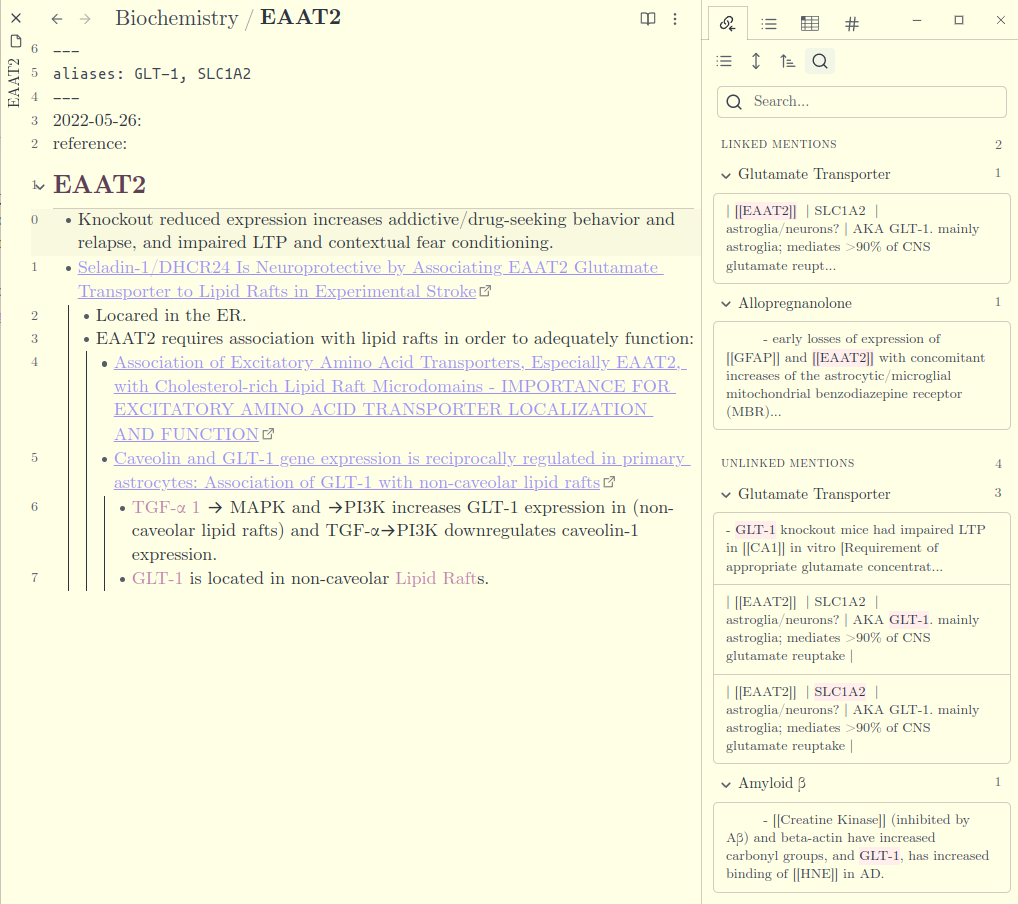
As you can see, studies obviously link a lot of disparate topics. Now when I Go to [[Lipid Raft]] or [[TGF-α 1]] to just go and get an overview of what I know about it (yes, wouldn’t it be bad if I didn’t do that often enough?) or just write something down and look in the corner of my eye at least, I have this new information to look at, just like I can read about a study about amyloid β that mentioned GLT-1.
All in all, I’ve found Obsidian absolutely instrumental in saving studies and annotations on them. My Scattered Notes posts (e.g. Scattered Notes: Deferoxamine) are (very slightly abridged versions of) some particularly massive individual notes I have.
Anki, or: How I Learned To Stop Worrying and Love the Flashcard
But of course, periodically returning to notes is only a weak form of spaced repetition, especially considering it doesn’t make use of the testing effect. These notes predate my use of Anki by at least a year or so, and it’s made subtle changes not to the form of my Obsidian vault (so far at least) but it has reduced the frequency of it, in a way.
Strangely enough I find myself wanting to delete certain things if I successfully ‘ankified’ them—why would I need them taking up space in my notes? Maybe one day I’ll make a Water page where I list everything I know about water, but for now I’ll simply trust my implicit understanding of it, you know? Just the same, it’s perfectly obvious to me that it’s the enzyme aromatase that catalyzes the conversion of testosterone to estradiol, and thus, there’s no explicit mention of this fact anywhere. Obviously if the topic needs further elaboration I’ll return to writing about it, but biology is not so concrete that it warrants explicitly stating everything an argument may be technically predicated upon, you know what I mean?
And we can pretend I know that because I made an Anki card for it, because that’s the process I’m trying to convey here; the evolution beyond mere notetaking. If a concept is hard to grasp, creating a properly formulated flashcard requires not only enough dopamine to feel like writing it, but a surprisingly nuanced and often higher-order level of understanding than what merely understanding a given fact requires. For example (I see this faux pas in medical Anki decks a lot) I could make a card “Q: How is estradiol synthesized? A: From testosterone via aromatase”, but things are never so simple in biology: estradiol can also be synthesized from estrone via 17β-HSD. So to formulate it the same way, it immediately has to be something like “Q: What are the *2* ways estradiol is synthesized” and that’s definitely bordering on not being atomic enough to remember, since now that’s actually 6 things in the answer to remember. Tedious work ensues trying to make a set of cards that accurately reflects everything you want to know (and sometimes, you don’t even know what that even is). For instance, how do you remember the fact that ]α7 nicotinic acetylcholine receptors colocalize with NMDA receptors in the dlPFC](https://www.ncbi.nlm.nih.gov/pmc/articles/PMC3718126/)? You’re going to need to have that be implied in between the lines with a bunch of other cards that require their own cognitive effort to create.
To make matters wose, sometimes these things are far from obvious facts. Sometimes even the first link between two things is entirely theoretical, perhaps based off an experiment in a single study. You could say fine, let’s do a literature review to make sure, but hold on—what are you talking about? A literature review to make a couple of flashcards? The thing is though, I do that often! But make no mistake, I’m moreso going for the low-hanging fruit in associated topics, and the information that’s interesting yet evades my complete understanding is simply written down for future. Rinse and repeat until your vault has thousands of files. This is the power of the wiki format of Obsidian, and I call this process something like ‘the funnel’ since it allows you to seamlessly jump between topics (cf. the idea of Learntropy such that it’s all ultimately subordinate to a PKM aggregation system. And then eventually, scrapbook fragments of knowledge may coalesce into ankifiable relationships that can be written into lucid flashcards without needing massive cognitive overhead anymore. Even if this isn’t entirely an issue of information but one’s mindset; more implicit things about a subject. Once again: amgituity is a bitch. So clearly, it can be really easy to just not even bother writing a card yet about this or that specific subject until you understand it really well. And continuing on that train of thought: knowledge does not exist in a vacuum, especially in biomedical science, but instead in the context of studies; articles; opinions of one person, but not necessarily universal fact. The fact of the matter is Anki shines with universal facts that are simple Q/A associations.
And but so1 it became a real paradigm shift when I got over a mental blockage of making cards about studies. For whatever reason, I was originally highly reluctant, no doubt because the idea of cognitive overhead itself was literally the matter at hand. So maybe it was just too many meta-levels of thinking for my brain to handle at the time. I wasn’t sure if it was a good idea to do cards that pertained to specific studies, but that seems pretty silly not to in retrospect, even if I’m not a researcher or whatever that has to keep track of citations. I wondered if it wouldn’t just result in pattern matching? I think it does to a certain extent, but I don’t see that as an entirely bad thing, since that comes with the bonus of keeping track of references, not infrequently a boon to fluidity of thought, which is the name of the game with spaced repetition (the idea that in our digital age you can technically look something up if you forget it, but that A) the time spent doing that would exceed the time spent reviewing a flashcard over your lifetime, and B) it makes a train of thought exponentially better when there is no time gap between ideas caused by poor memory of a certain fact and having to look it up or having to ‘buffer’ uncertainty). But in line with the 20 rules, what else would it be besides something so simple as giving a screenshot of the title? So that’s what I did, and it represents one of a few major improvements I can think of in my card-making heuristics in my journey to become an Anki virtuoso.
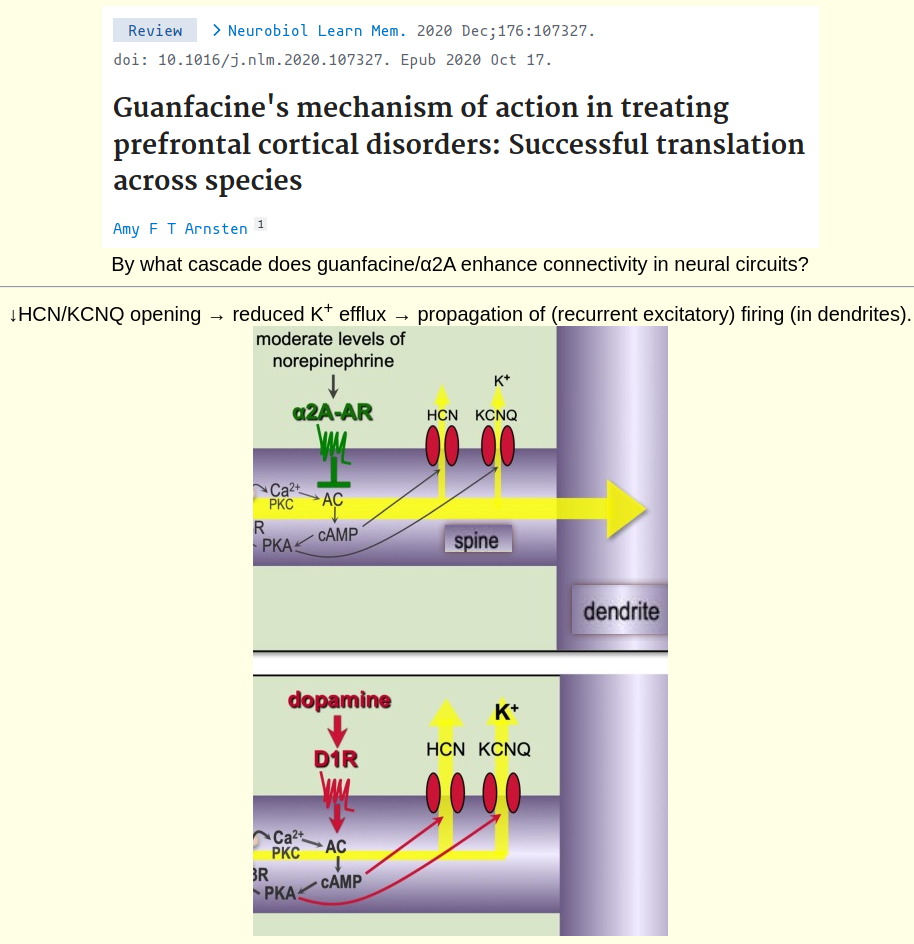
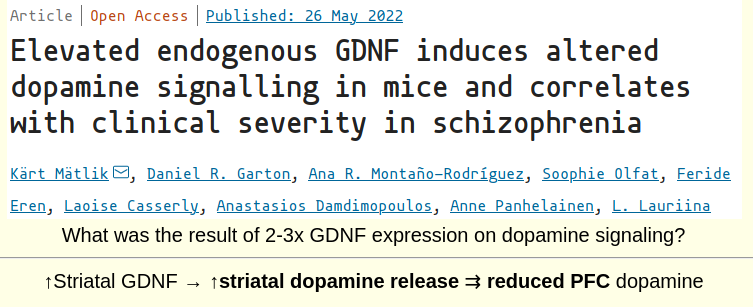
I might make up to say, 10 cards like this for an interesting study. Or, maybe just a single card asking for the key finding.
Here are some regular cards. You probably could’ve just used your imagination to figure out what these look like though.

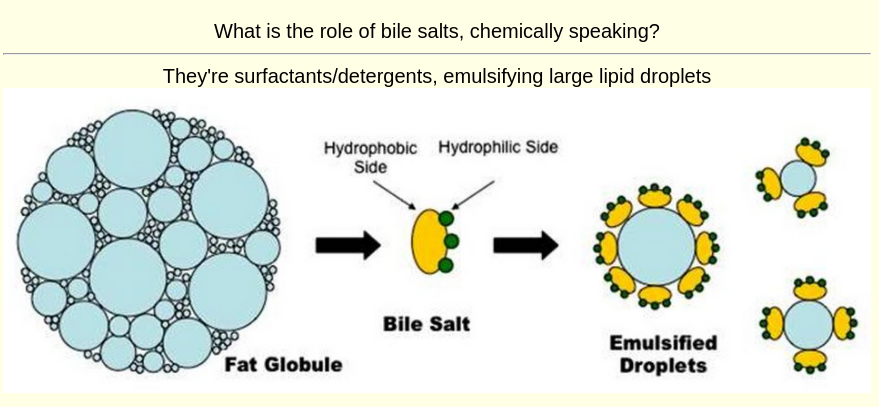

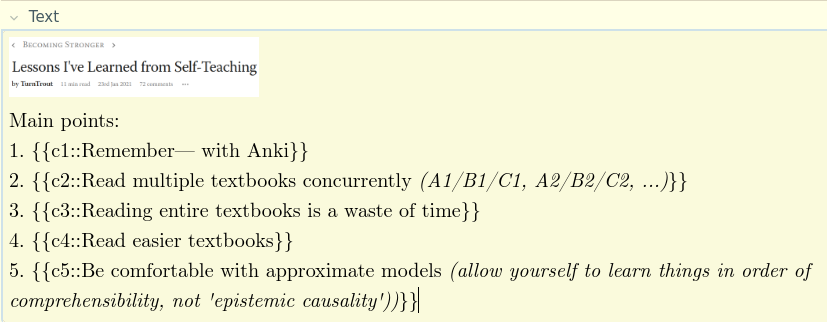
So at this point, I’m still learning little personal heuristics here and there. But YMMV. A word on pre-made decks: I think they’re okay. It’s generally well-recognized in the Anki community that you remember best when you make your own cards (though in medical school anki it’s a whole different ballgame where you do not have time for that). I’ve downloaded a lot of pre-made decks for pretty much any subject I can think of and, much like how I explaind above as for why wrote this article and why I read so many other people’s articles, I basically only download them to get an idea of what other people have done. I rarely just copy+paste cards from their deck to mine; it’s moreso to get an idea of a ‘curriculum’ for a given topic; to see how someone else went through a topic is if nothing else… reassuring? (Kind of like watching experts at work facilitating learning of tacit knowledge) But at this point, I have a few dozen crammed to the bottom of my collection never to be reviewed, and I occasionally search my entire collection for keywords I want to learn, and often there’s a match, and I’ll often look at what else is near that card in its relative position in its deck to know what else I ought to know, you know. The underlying ideas behind the cards should all look familiar (“Do not learn if you do not understand”) and may all be worded/formulated in ways you would never write cards, but there’ll be a recognition that maybe you overlooked something or its connections. And so, the best pre-made decks for you to check out are those that start from the ground up so that you can retrace topics you previously covered yourself from a slightly different perspective. For instance, Brian Spiering’s public decks on CS/math topics satisfy everything I’ve talked about.
So I look forward to GPT/AI flashcard creation that automatically does the heavy lifting for you of phrasing things right, and things like that. I’ve experimented with it with ChatGPT (for instance automatically creating cards from a (large) body of text (et al.)) but I haven’t figured out how to really make it any better or faster than doing things yourself. The next step is having an AI that actively keeps up with your current knowledge base (cf. some of Paul Bricman’s prototypes) and is able to seamlessly curate a daily digest of cards with novel information in whichever direction you decide. (For example in the Japanese/language learning community, they have the idea of i+1 sentence cards, where there is only 1 word you don’t know, and these can be detected (in ‘sentence mining’ via reading/watching media) or even automatically created, so long as every word you know is somehow logged, e.g. MorphMan).
Anki Tips
-
Use the FSRS algorithm, which is still kind of under the radar, but I think it represents a pretty big step forward. Here is a breakdown of how the creator devised the algorithm—it’s pretty cool.
- A great feature this has is being able to set different target retentions for each of your decks if you want. For example my default is 0.86, but math deck is at 0.9 since that benefits a lot from not never forgetting the basics, while my IT deck is at 0.82, since it has a lot of trivial knowledge like what this or that program does.
-
Nobody is too good for mnemonics. If you have leeches that you really want to remember but can’t think of any way to make it stick any further, this could be an ace up the sleeve.
- For example, I kept mixing up Tay Sach’s disease being a lack of hexosaminidase activity, and Farber disease being a lack of acid ceramidase activity. I asked ChatGPT to make some mnemonics to help me differentiate these 2 (technically 4, since they’re reversed) cards, and got the association of Sach’s = six = hex(osaminidase) and Farber = brrrr = AC = acid ceramidase. Trust me, this stuff works. Just like that, I never forget them now.
-
Basic cards > all. Cloze and image occlusion have their uses, but whenever possible, I find standard Q/A format to easily be the most robust format with minimal pattern matching. I don’t care what it is: even anatomy benefits from asking you to visualize—at least as a kind of equivalent to reversed/double-sided cards.
- This is one reason why I’m a bit skeptical of RemNote. Interesting in theory, and probably more featureful than most apps, but I think it can easily lead to unnecessary pattern matching, as well as not really being atomic enough. I’ll have to elaborate on that, though. And like I mentioned in Note-Taking Broadly Considered; How I Research Things, wouldn’t it be pointless to have stuff that’s supposed to be in your LTM still in your notes? Notes are a workspace, not exactly a database per se in that way.
-
Focused sessions. Having it open on another monitor or just doing it in those little empty moments in the day like on the toilet, etc. are okay, but I find that if I sit down with the intention of doing Anki, I get done exponentially faster than sporadic reviewing. I just get in the zone.
-
Get all the Add-ons you think you need. The majority of mine are kind of just cosmetic, but that can make a big difference.
-
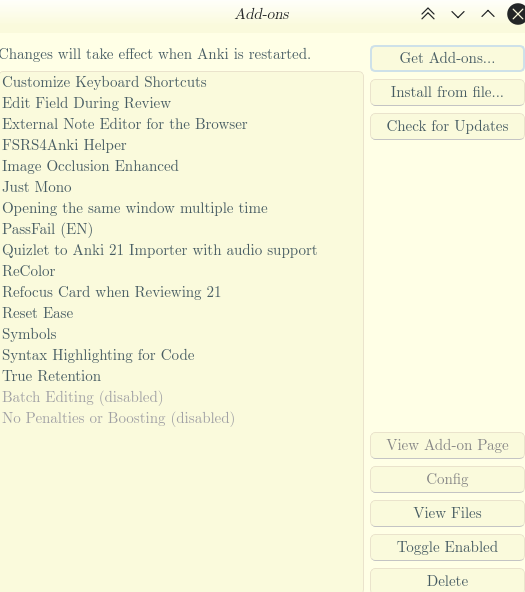
- Opening the same window multiple time is great when you’re really at the point where Anki serves as a workspace for you to jump between topics. Saving certain queries/browsing certain decks in multiple browser windows, adding several cards at once. I can’t tell you how many times I wanted to ankify a piece of knowledge only to swiftly realize it’s predicated on several other engrams in order to make understanable a properly-formulated card (or to make properly-formulated a set of understandable engrams…) and sometimes this goes down to the nth level across several different sources (especially when the modafinil is really hitting… thank you tunnel vision.)
-
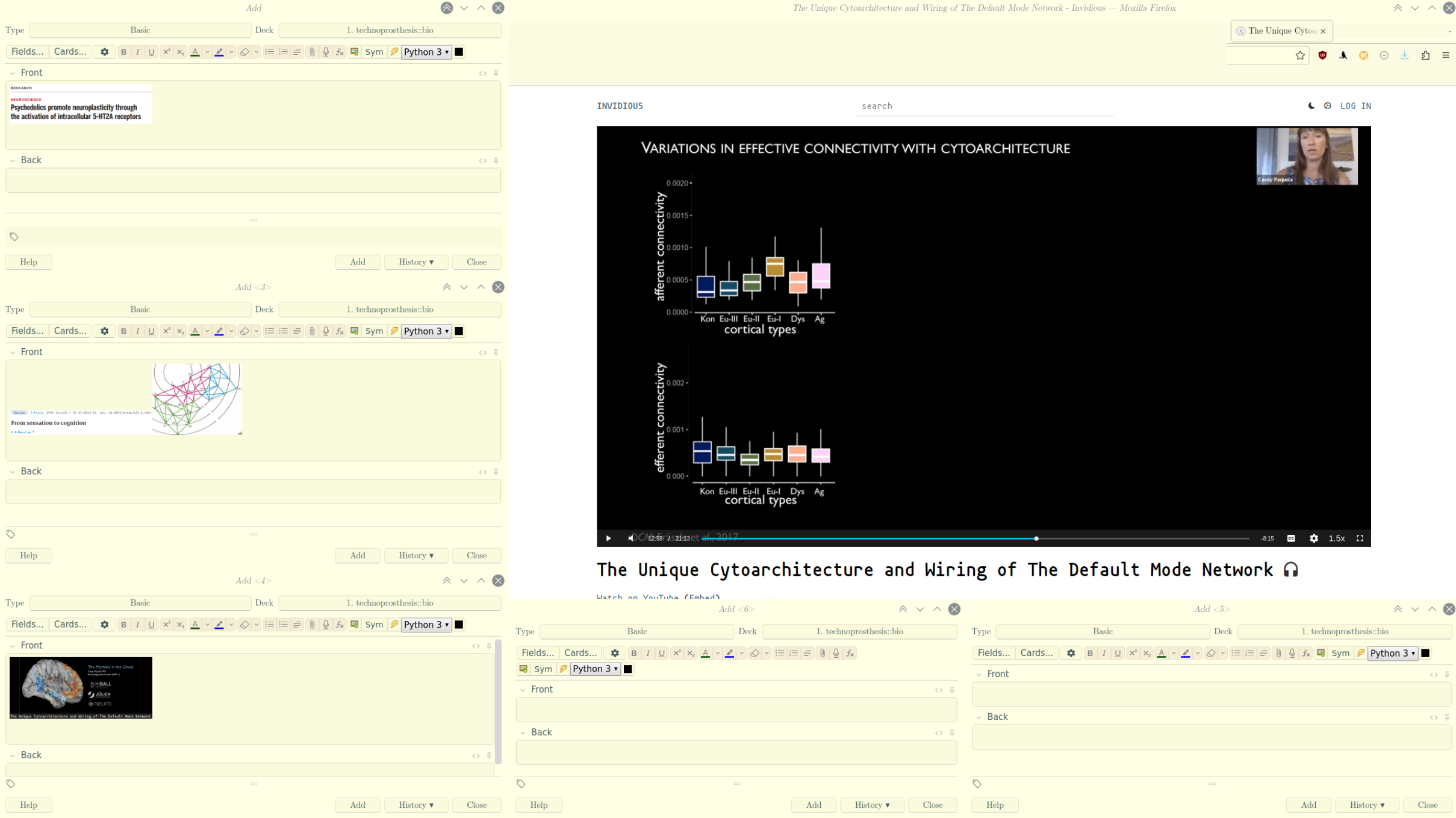 When I’m studying hard I expect to eventually see something like this emerge on my monitor, though I usually leave the card adding windows floating+pinned to top.
When I’m studying hard I expect to eventually see something like this emerge on my monitor, though I usually leave the card adding windows floating+pinned to top.
-
- I use PassFail. I learned about this from the Japanese/language learning community’s way of of preventing ’ease hell’ as well as overthinking. This lets you get done with reviews a lot quicker, and it lets you use the volume button on your phone, and other devices: During a period of desperately figuring out ways to deal with RSI (ultimately cured with wrist extensor training, but that’s another conversation), I bought a 4-key external keyboard to use and bind Pass/Fail/Undo/Sync to, so that I could use it in any position I please, even standing with my hands down—without having to strain my wrist and whatnot keeping my hand static over a space bar.
- Review Heatmap: I don’t see the point at all. You’ll learn the brutal repurcussions of skipping a day; I don’t think you need some tesselated eyesore under your decks to ‘motivate’ you.
-
Resources/Further Reading
I’ve read all of these, in hopes of gleaning even a modicum of insight in process, since best practices with this stuff will pay off handsomely in the long run. (Watching experts at work)
-
Andy Matuschak is the best place to start:
- Why: Why books donʼt work
- How: How to write good prompts: using spaced repetition to create understanding
- His ‘working notes’ are fantastic, with the occasional really interesting original idea in there, like OS-level spaced repetition systems (along the lines of how everything is an interfaceable file in Plan 9. This kind of thinking is what drives real paradigm shifts, and he talks about that, too.)
-
The next mandatory reading: Augmenting Long-term Memory by Micheal Nielsen, who is an Anki fanatic, and has other writings about it:
-
Spaced Repetition for Efficient Learning · Gwern.net delivers like usual. He actually has a lot of links. However! He’s missing a few—and if nothing else, a list like that is what I intended for this post to be.
-
https://supermemo.guru/wiki/SuperMemo_Guru ‘gold mine’ might be an understatement. If you love to learn, then this wiki is a must-read. I’m positive you’ll have fun perusing this site.
- The 20 rules of knowledge formulation is also mandatory reading for upping your Anki skill. Matuschak talks about a lot of this though.
-
Paul Bricman these are only prototypes (years dated, at that—and notably pre-ChatGPT), but I think this guy is a genius. Seems to be at least a decade ahead of the curve on using spaced repetition as a new pedagogic/software paradigm and taking what we know to its logical extreme. He’s working on alignment now, though.
-
https://wiki.issarice.com/wiki/Category:Spaced_repetition absolutely fantastic, especially for math. Big ass zettelkasten site on a mediawiki instance.
- A fan of mathematics, he has a deck on Tao’s Analysis (he actually made it in Orbit). He has a lot to say on making proof-based or otherwise mathematical cards: https://wiki.issarice.com/wiki/Spaced_proof_review as well as the idea of finding out the best practices for ‘Big cards’ (which on one hand go against standard best practices for flashcards, but on the other hand, the potential utility is apparent).
- https://wiki.issarice.com/wiki/Add_all_permutations_of_a_card_to_prevent_pattern-matching
- He also created r/FlashcardCrafting
- (And other cool stuff: https://machinelearning.subwiki.org/wiki/User:IssaRice)
-
https://old.reddit.com/r/AnkiComputerScience/comments/jyd0wq/how_do_you_build_cards_to_learn_proofs/gd2qu4w/ this guy knows what he’s talking about if you stalk his posts. Found this just today.
-
Chasing 10X: How Anki Saved My Software Career and its sequel Strategies, Tips, and Tricks for Anki
- This is one of my favorites. But as of today it looks like most of the images are in the afterlife. Nonetheless, I really appreciated how in-depth he went in explanining his exact thought processes. A notion you may familiarize yourself with is that flashcard creation is a virtuosic process that rewards having a nuanced metacognition. Again, this is why writing your own cards is the best.
-
Effective Spaced Repetition | borretti.me
- Also one of my favorites. Does an exemplary job at breaking down and explaining the ‘syntactical’/‘mathematical’ essence of how a desired piece of knowledge is properly turned into all the necessary flashcards.
-
-
Make Memory a Choice, Not Chance. | by Kyle Clements | Medium
-
Artem Kirsanov, a computational neuroscience researcher, has a few videos on his worflow for knowledge acquisition, which primarily consists of Obsidian, Zotero, and Anki.
- From How to REMEMBER what you read 🧠: a pretty basic overview of Anki, but interestingly he shows some examples of how he makes research cards:
-
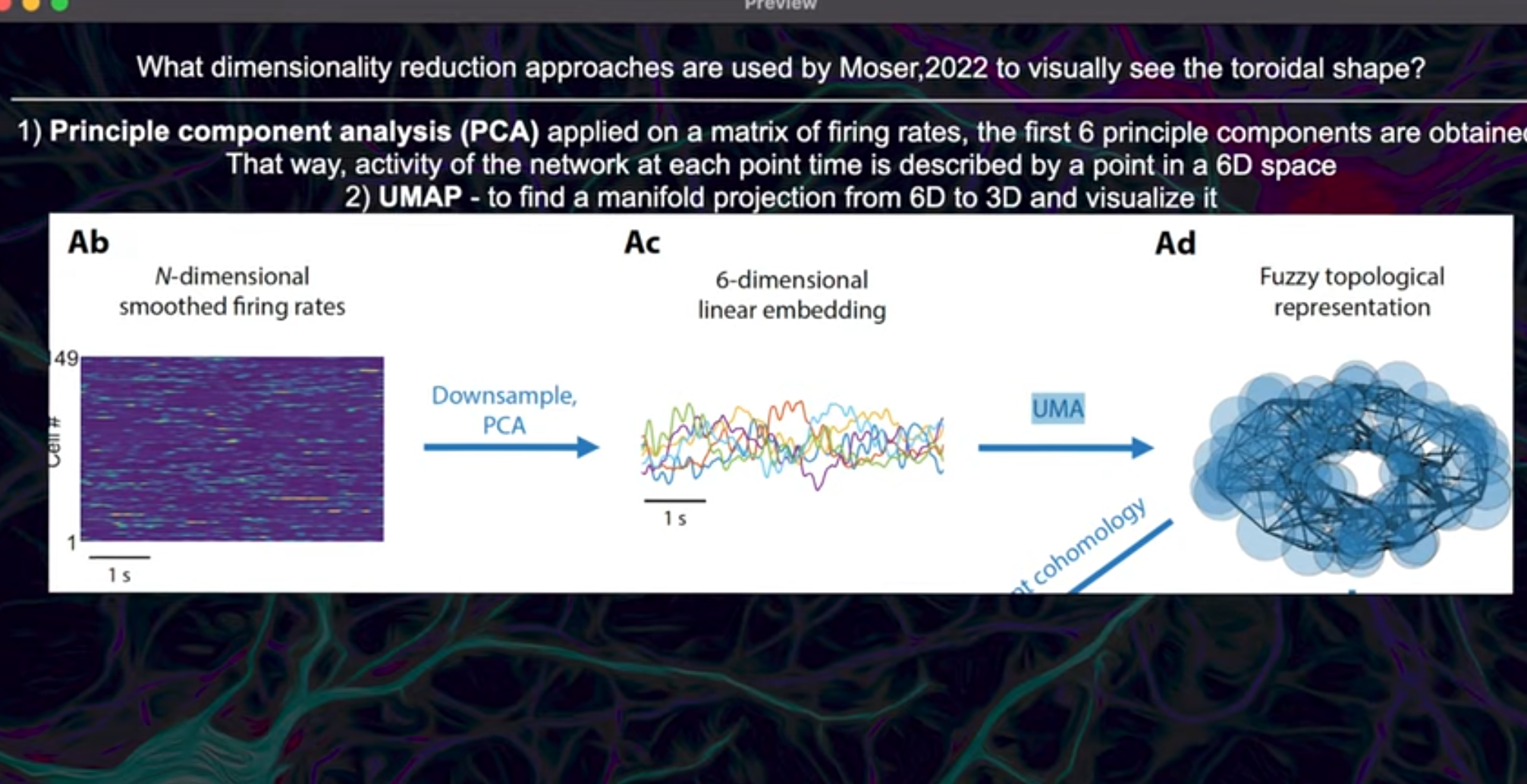
-
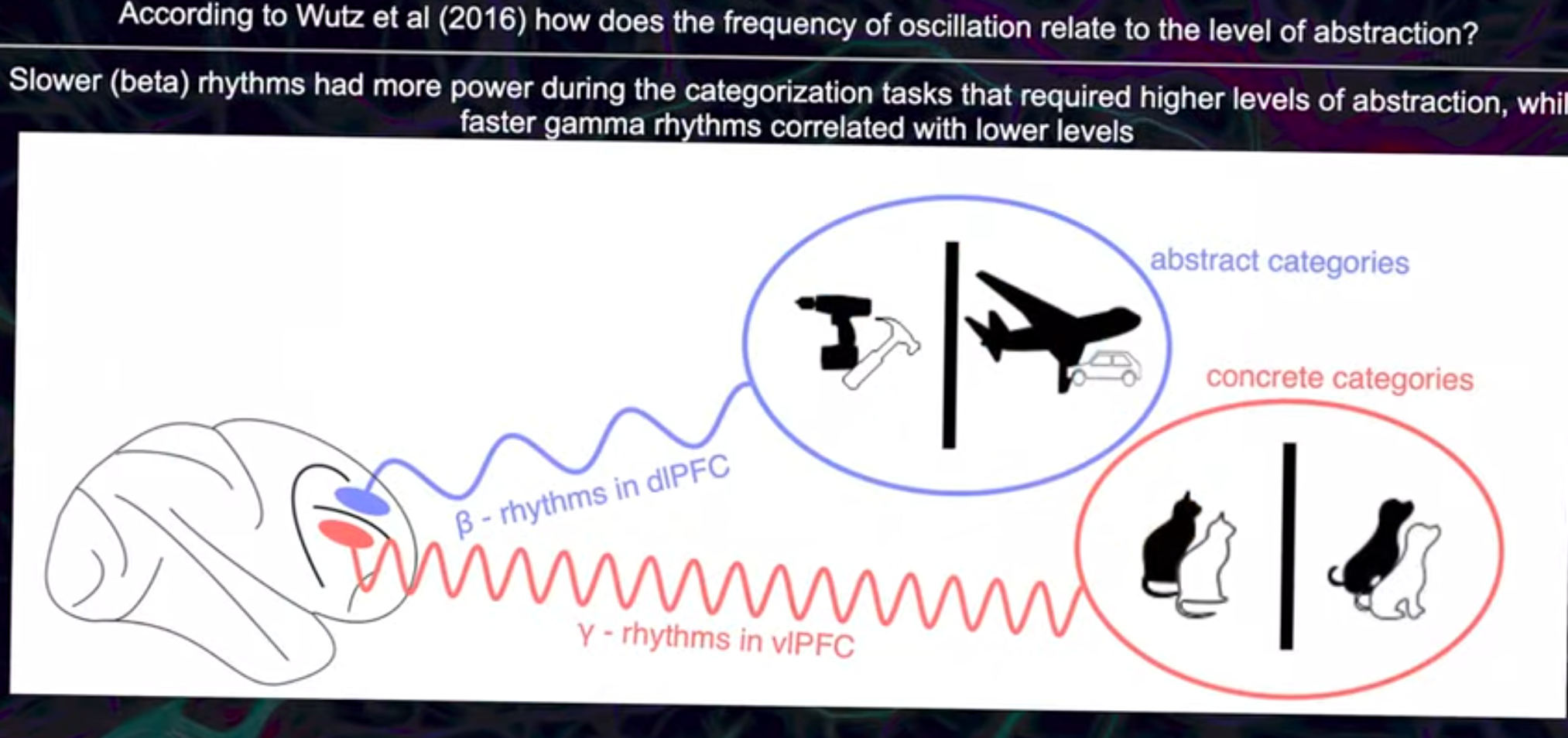
-
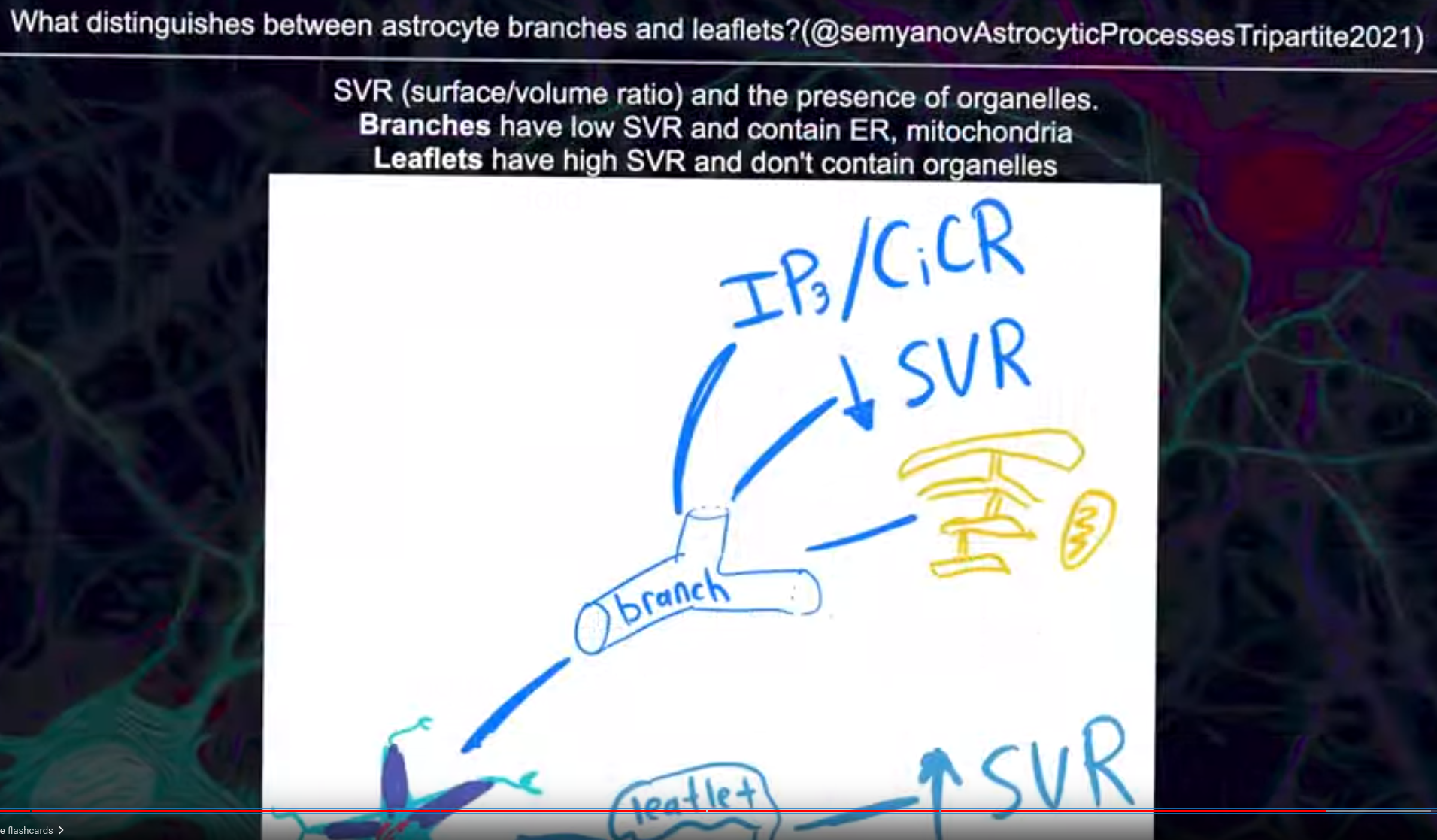
- Notice how he simply refers to the paper as <Name, year> since indeed as a researcher that’s something he needs to remember, unlike my format shown above. These are also probably decks sorted by a certain class or a certain video where there are only few key papers; if there’s no additional context like that, having hundreds of citations denoted like this in a single deck seems like a nightmare.
-
- From How to REMEMBER what you read 🧠: a pretty basic overview of Anki, but interestingly he shows some examples of how he makes research cards:
-
Anki as Learning Superpower: Computer Science Edition some advice for breaking down mathematics proofs atomically as possible.
-
https://www.jackkinsella.ie/articles/janki-method for programming-oriented tips.
-
There’s a wealth of posts on LessWrong relating to using SRS to study (textbooks):
- DirectedEvolution/AllAmericanBreakfast’s posts:
- Turntrout’s posts:
-
Is Expanded Retrieval Practice a Superior Form of Spaced Retrieval? A Critical Review of the Extant Literature. - ‘Spaced retrieval’ here referring to fixed intervals. (The answer is yes.)
-
https://old.reddit.com/r/Anki/comments/w4pui6/i_think_the_spaced_repetition_community_should_up/ih3isq5/ Too long intervals > too short?
-
https://twitter.com/andy_matuschak/status/1621276086779912192 reviewing 1 day after lapsing, rather than some percentage, is the way (this is default on Anki)
-
https://warosu.org/sci/thread/S10439507
- This one guy opens ebook textbooks in GIMP (which opens each page as a layer) and deletes pages that have been successfully ‘extracted’, leaving behind stuff you don’t really get or isn’t explained well. Go back a 2nd time after finishing and you’ll absorb it all. Very interesting, though kind of weird reading in GIMP, lol. That would be cool to implement in a PDF reader, with a function to delete the current page, if nothing else.
